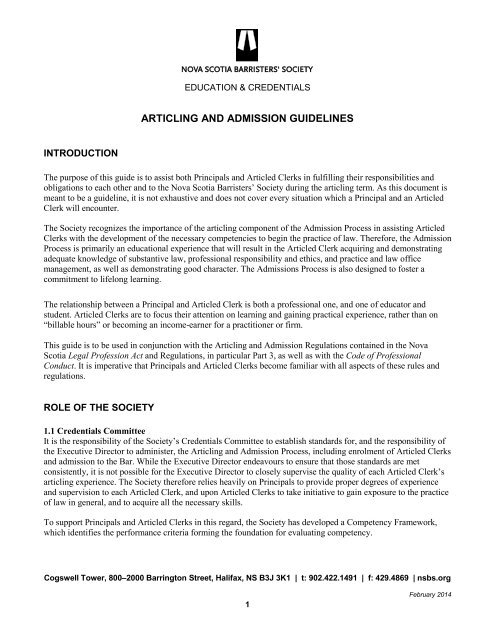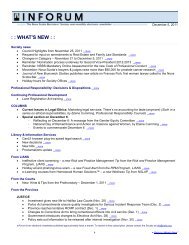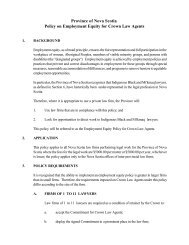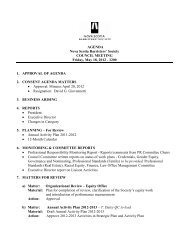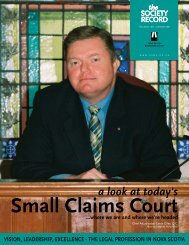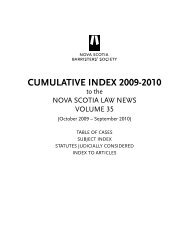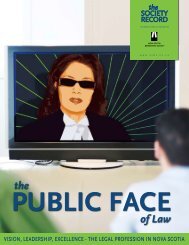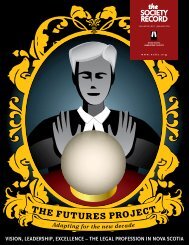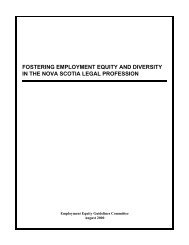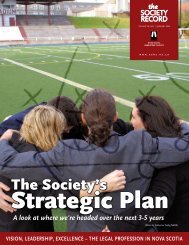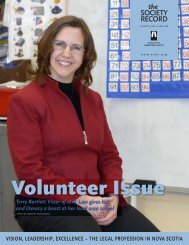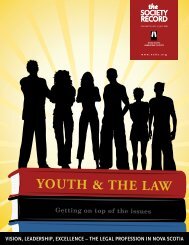Articling and Admissions Guidelines - Nova Scotia Barristers' Society
Articling and Admissions Guidelines - Nova Scotia Barristers' Society
Articling and Admissions Guidelines - Nova Scotia Barristers' Society
Create successful ePaper yourself
Turn your PDF publications into a flip-book with our unique Google optimized e-Paper software.
EDUCATION & CREDENTIALSmay be terminated by application to the Executive Director. Such termination will not jeopardize creditfor any period of articles already completed <strong>and</strong>, under normal circumstances, should not prevent anArticled Clerk from completing the articling term with another Principal.OBLIGATIONS AND RESPONSIBILITIES OF PRINCIPALS2.1 Criteria for Serving as a PrincipalThe success of any articling experience depends on the willingness of the Principals to take an active role inproviding the Articled Clerk with knowledgeable <strong>and</strong> ethical guidance. This responsibility is significant. It is aprivilege for any member of the <strong>Society</strong> to be entrusted with this duty. While the Committee recognizes the valueof the mentoring relationship between Articled Clerk <strong>and</strong> Principal in the traditional relationship between oneArticled Clerk who is assigned to one lawyer for the entire period of articles, it also recognizes that otheracceptable arrangements exist. In recognition of this, the role of Principal can be assumed by either a lawyer or afirm. In either case, restrictions apply. To qualify as a Principal, a lawyer must be a practising lawyer in <strong>Nova</strong><strong>Scotia</strong>, have resided <strong>and</strong> practised law in <strong>Nova</strong> <strong>Scotia</strong> for at least five years, not be otherwise prohibited fromacting as a Principal, <strong>and</strong> be committed to providing Articled Clerks with an articling experience in which theeducational component is of paramount importance. For further specifics on eligibility, see Regulation 3.5.2.To qualify as a Principal, a firm must satisfy the Executive Director that it is comprised of members who have acommitment to, <strong>and</strong> support for, providing Articled Clerks with an articling experience in which the educationalcomponent is of paramount importance; it has a designated Supervising Lawyer, who develops an individual<strong>Articling</strong> Plan with the Articled Clerk <strong>and</strong> agrees to oversee its implementation; the Supervising Lawyer, onbehalf of the firm, accepts responsibility for the Articled Clerk’s educational experience; <strong>and</strong> it does not havemore Articled Clerks than there are lawyers who are also otherwise qualified to act as Principals available toprovide adequate supervision <strong>and</strong> feedback.In addition, the Executive Director has authority to prohibit or limit the articles of an Articled Clerk with a lawyer orfirm in appropriate circumstances. If the Executive Director becomes aware of any serious breaches by a Principal ofthe Professional Responsibility, Trust Account or other Regulations, or of the rules set out in the Code ofProfessional Conduct, it may result in an investigation to determine whether or not that lawyer or firm will bepermitted to continue to act as Principal, or whether the articles should be limited in terms of time, areas of practiceor both.2.2 General ResponsibilitiesThe <strong>Society</strong> takes the position that a Principal entering into an articling relationship has an obligation to providethe Articled Clerk with the time, patience <strong>and</strong> supervision required to ensure that the Articled Clerks who proceedthrough the <strong>Articling</strong> Program will be competent to practise law by possessing the knowledge, skill level <strong>and</strong>attributes of a newly called lawyer.2.3 Specific ResponsibilitiesA Principal has a duty to ensure that an Articled Clerk is exposed to <strong>and</strong> has the necessary skills for the practiceof law upon admission. This means that a Principal should instruct an Articled Clerk in lawyering skills, practice<strong>and</strong> office management skills, <strong>and</strong> professional responsibility. At the conclusion of the articling term, thePrincipal is required to certify that the Articled Clerk possesses the knowledge, skills <strong>and</strong> attributes expected of anewly called lawyer, as identified in the <strong>Society</strong>’s Competency Framework. The <strong>Society</strong> relies heavily uponCogswell Tower, 800–2000 Barrington Street, Halifax, NS B3J 3K1 | t: 902.422.1491 | f: 429.4869 | nsbs.org4February 2014
EDUCATION & CREDENTIALSPrincipals to provide adequate levels of supervision <strong>and</strong> experience to Articled Clerks, <strong>and</strong> it is not expected thatArticled Clerks will be used extensively for title searching or as err<strong>and</strong> runners. While Articled Clerks mayoccasionally be expected to deliver or serve documents upon other lawyers, this should not be an Articled Clerk’smain occupation. Ultimately, Principals must ensure that common sense is applied in determining such matters.2.4 Compliance with Education <strong>and</strong> <strong>Articling</strong> PlansA Principal also has a duty to ensure that the Articled Clerk’s articling experience complies with the Principal’sapproved Education <strong>and</strong> <strong>Articling</strong> Plans <strong>and</strong> to ensure that the Articled Clerk will be provided with a reasonableopportunity to obtain instruction <strong>and</strong> training as outlined in the approved Plans.2.5 Professional Responsibility <strong>and</strong> ConductIn addition to <strong>and</strong> concurrent with the Principal’s responsibility to assist the Articled Clerk in obtaining practicalexperience, it is imperative that the Principal advise <strong>and</strong> counsel the Articled Clerk in such things as appropriateconduct before the courts, among fellow lawyers <strong>and</strong> toward members of the public. The Principal must providethe opportunity for Articled Clerks to learn by example how to conduct the practice of law in an ethical fashion.Principals should ensure that Articled Clerks are thoroughly familiar with the Code of Professional Conduct <strong>and</strong>the Legal Profession Act <strong>and</strong> Regulations. The disciplinary functions of the <strong>Society</strong> should be made clear toArticled Clerks, <strong>and</strong> Articled Clerks should be instructed to answer promptly <strong>and</strong> clearly any communication theyreceive from the <strong>Society</strong> in the course of their career at the Bar. Because the <strong>Society</strong> is a self-governing body, it ismost important that Articled Clerks be made aware that any breaches of the Act or Regulations of the <strong>Society</strong> by amember should be responsibly reported to the Bar <strong>Society</strong>.2.6 Law Practice ManagementPrincipals have a responsibility to ensure that Articled Clerks become familiar with proper law officemanagement procedures, including the operation of both general <strong>and</strong> trust accounts, prioritizing workloads, ticklersystems, staff relations, client relations <strong>and</strong> correspondence, <strong>and</strong> other procedures. Some of these topics arediscussed during the Skills Course but practical experience is essential. Experience has shown that Articled Clerkswill tend to follow the methods <strong>and</strong> office procedures learned in their Principal’s offices; however, this isconsistently one of the most neglected areas of exposure for Articled Clerks. Principals must provide ArticledClerks with sufficient knowledge <strong>and</strong> skills in practice management to enable Articled Clerks to establish theirown practice following admission.2.7 Court AppearancesUnder the Act <strong>and</strong> Regulations, there is no limitation on what Articled Clerks can or cannot do in various courts orin various proceedings. While there are no specifics in the Act <strong>and</strong> Regulations, the Regulations create an obligationfor the Principal to supervise <strong>and</strong> provide feedback pursuant to the approved Education Plan <strong>and</strong> the Education Planhas to be adhered to. Until an Articled Clerk has demonstrated competence to undertake a particular task, thePrincipal should not permit the Clerk to do that task unsupervised. It is emphasized that it is the Principal’sresponsibility to ensure that the Articled Clerk obtains the required degree of knowledge <strong>and</strong> expertise undersupervision by the Principal or the firm in proceedings before the courts. Principals are reminded that they are at alltimes responsible for actions of their Articled Clerks <strong>and</strong>, in particular, the following should be noted:a) The Principal must be satisfied that the Articled Clerk is adequately briefed, not only on the facts of thematter but also on the applicable law. Proper deportment <strong>and</strong> etiquette before the courts must beensured <strong>and</strong> the Articled Clerk should be advised on all occasions that the court must be notified thatCogswell Tower, 800–2000 Barrington Street, Halifax, NS B3J 3K1 | t: 902.422.1491 | f: 429.4869 | nsbs.org5February 2014
EDUCATION & CREDENTIALSthe Clerk is an Articled Clerk, articled to the Principal, <strong>and</strong> the Articled Clerk is attending with theconsent of both the Principal <strong>and</strong> client;b) Except in matters of a very routine nature, the client must both underst<strong>and</strong> <strong>and</strong> agree that the ArticledClerk may appear instead of the Principal in the matter;c) Under no circumstances should an Articled Clerk be requested to h<strong>and</strong>le a difficult <strong>and</strong> complex matteralone. The interests of the client may be compromised <strong>and</strong> the administration of justice may be broughtinto disrepute. It is in the interests of clients to ensure that they obtain the best counsel, <strong>and</strong> thereforethe Principal’s attention to these matters is important.2.8 Suitability of Applicants for AdmissionIn order to be called to the Bar, an Articled Clerk must have demonstrated attributes of good character during theClerk’s articling term. Demonstrated attributes of good character include honesty, fairness, c<strong>and</strong>or,trustworthiness, observance of fiduciary responsibility <strong>and</strong> respect. A Principal is expected to observe thequalities the Articled Clerk exhibits during the articling term <strong>and</strong> to discuss any issues of good character with theArticled Clerk. At the conclusion of the articling term, the Principal is required to complete a Statement of GoodCharacter in addition to certifying that the Articled Clerk possesses the knowledge <strong>and</strong> skills expected of a newlycalled lawyer. It is the view of the <strong>Society</strong> that the execution of this Statement by the Principal is a responsibilitythat should not be treated lightly.In spite of safeguards, there will be Articled Clerks who for one reason or another may be unsuitable for thepractice of law. This is a very serious matter, <strong>and</strong> it is the obligation of Principals to report to the <strong>Society</strong> on aconfidential basis if they feel that in their judgment there is any question about the suitability of an applicant foradmission to the Bar.If a Principal learns that an Articled Clerk has been guilty of criminal conduct, untruths or conduct unbecomingtowards a client, another colleague, members of the Judiciary or the public generally, this should be reported tothe <strong>Society</strong>.OBLIGATIONS AND RESPONSIBILITIES OF ARTICLED CLERKS3.1 GeneralAs articling is one of the last steps in the formal legal education process prior to call to the Bar, Articled Clerksare expected to approach the articling experience with a mature <strong>and</strong> responsible attitude. Articled Clerks areexpected to dress appropriately <strong>and</strong> to conduct themselves in a proper manner. They are encouraged to askPrincipals to allow them to be present at interviews with clients <strong>and</strong> the taking of instructions, giving of opinions,preparing witnesses for trial <strong>and</strong> so on. Articled Clerks are expected to bring responsible <strong>and</strong> sensible workpractices to their Principals’ offices <strong>and</strong>, when in doubt, to ask questions.3.2 Compliance with Education <strong>and</strong> <strong>Articling</strong> PlansArticled Clerks should become familiar with the approved Education Plan filed by the Principal, as compliancewith the Education Plan will be a requirement for admission to the Bar. Articled Clerks should also be familiarwith the Articled Clerk’s individual <strong>Articling</strong> Plan, which attaches the approved Education Plan. The individual<strong>Articling</strong> Plan will either confirm the commitments made in the approved Education Plan or identify the changesCogswell Tower, 800–2000 Barrington Street, Halifax, NS B3J 3K1 | t: 902.422.1491 | f: 429.4869 | nsbs.org6February 2014
EDUCATION & CREDENTIALSapproved by the Executive Director. The approved Education Plan is referenced when Principals <strong>and</strong> ArticledClerks complete the Mid-term <strong>and</strong> Final Reports.The Articled Clerk should take initiative <strong>and</strong> frequently meet with the Principal to review <strong>and</strong> discuss the status ofthe Education <strong>and</strong> <strong>Articling</strong> Plans during the articling term.3.3 Professional Responsibility <strong>and</strong> ConductArticled Clerks are responsible to the <strong>Society</strong> <strong>and</strong> are subject to the disciplinary regulations which have beenestablished by the <strong>Society</strong>. Articled Clerks should read the Regulations of the <strong>Society</strong>, found on the <strong>Society</strong>’swebsite: www.nsbs.org. It is also strongly recommended that Articled Clerks read <strong>and</strong> become familiar with theCode of Professional Conduct, found in the Bar Review Outlines <strong>and</strong> also available on the website. ArticledClerks are urged to speak with Principals on all matters of an ethical nature that may arise for which the propersolution is not readily apparent.Articled Clerks must identify themselves as Articled Clerks, including on written documentation.3.4 Law Practice ManagementArticled Clerks must become thoroughly familiar with proper law office procedures, including the operation ofboth general <strong>and</strong> trust accounts, prioritizing workloads, tickler systems, staff relations, client relations <strong>and</strong>correspondence, <strong>and</strong> other essential procedures. Articled Clerks are advised to approach learning all aspects oflaw office economics <strong>and</strong> management from the perspective of a newly called lawyer commencing the lawyer’sown practice of law.3.5 Court AppearancesUnder the Act <strong>and</strong> Regulations, there is no limitation on what Articled Clerks can or cannot do in various courtsor in various proceedings. While there are no specifics in the Act <strong>and</strong> Regulations, the Regulations create anobligation for the Principal to supervise <strong>and</strong> provide feedback pursuant to the approved Education Plan <strong>and</strong> theEducation Plan has to be adhered to. Until an Articled Clerk has demonstrated competence to undertake aparticular task, the Principal should not permit the Clerk to do that task unsupervised.3.6 Work ArrangementsClerks are expected to complete their articles on a full-time basis. Requests for part-time arrangements or leavesof absence must be approved by the Executive Director <strong>and</strong> must have the approval of the Principal in order to beconsidered.Secondment of articles to another lawyer who is also otherwise qualified to act as Principal are permitted, as longas the secondment is in accordance with the approved Education Plan.THE BAR ADMISSION COURSEThe Bar Admission Course was established as the means for the <strong>Society</strong> to determine that those who successfullycomplete the course possess the required level of competence. Articled Clerks must complete the Bar AdmissionCourse during their 12 months of Articles. Any deviation must be approved by the Executive Director.Cogswell Tower, 800–2000 Barrington Street, Halifax, NS B3J 3K1 | t: 902.422.1491 | f: 429.4869 | nsbs.org7February 2014
EDUCATION & CREDENTIALSThe Bar Admission Course consists of three components: a Skills Course, the Bar Examination <strong>and</strong> any requiredSeminars. Attendance at all components of the Bar Admission Course is m<strong>and</strong>atory. Each year, Bar AdmissionCourse skills sessions are scheduled, <strong>and</strong> students must complete an application to attend the course. The SkillsCourse is delivered through both online <strong>and</strong> in-person formats: a classroom component requiring three weeks offull-time attendance in the fall, <strong>and</strong> three online modules delivered throughout the year according to the BarAdmission Course schedule.Principals <strong>and</strong> firms must accommodate their Articled Clerks’ schedules when attending the Skills Course <strong>and</strong>completing the Bar Examination during the articling term. Attendance at all class sessions of the Skills Course,including seminars, is m<strong>and</strong>atory. Involvement in other work, no matter what its nature, will not constitute anadequate reason for failure to attend the course. An Articled Clerk must adhere to the Regulations regardingperforming work for a Principal or firm while attending the Skills Course.Inquiries concerning <strong>and</strong> applications for the Bar Admission Course should be directed to the Education &Credentials Department, Cogswell Tower, 800–2000 Barrington Street, Halifax, NS B3J 3K1. Telephone: 422-1491; Fax: 429-4869; email articling@nsbs.org.APPLICANT’S QUESTIONNAIREAll Articled Clerk applications must include an Applicant’s Questionnaire. This Questionnaire is broken into twoforms: Part 1 asks a series of general questions regarding employment <strong>and</strong> good character; Part 2 asks questionsrelating to fitness. This second form is for the <strong>Society</strong>’s information only, <strong>and</strong> it is not required that the ArticledClerk submit this to the Articled Clerk’s Principal or firm.The <strong>Society</strong> has a m<strong>and</strong>ate to protect the public. In carrying out this m<strong>and</strong>ate, the <strong>Society</strong> must ensure thatapplicants for admission are fit for the practice of law. The practice of law is often rigorous, dem<strong>and</strong>ing a highlevel of functioning. Any circumstance that would render a person incapable of practising law competently putsclients’ interests at risk, <strong>and</strong> harms the profession’s reputation.The <strong>Society</strong> recognizes that most people experience pressures in life <strong>and</strong> that people respond to those pressuresdifferently. An individual may be quite capable of practising law competently, in spite of past difficulties. It is the<strong>Society</strong>’s goal as the governing body of the profession to determine if an applicant has an impairment thateffectively disables that individual from carrying out the functions normally required of a lawyer. To this end, the<strong>Society</strong> is looking for information about conditions an applicant is currently experiencing <strong>and</strong> that could impairhis or her ability to article. The <strong>Society</strong> is not looking for information about past conditions that have beenresolved <strong>and</strong> are not currently affecting the individual’s ability to complete the duties of an Articled Clerk.Because someone may have sought professional assistance for a problem is not a bar to enrolment. In most cases,evidence of having sought professional assistance is positive evidence, as it suggests that an individual is activelyseeking to deal with the circumstances <strong>and</strong> take control of his or her life.ADMISSIONCogswell Tower, 800–2000 Barrington Street, Halifax, NS B3J 3K1 | t: 902.422.1491 | f: 429.4869 | nsbs.org8February 2014
EDUCATION & CREDENTIALSThere are quarterly calls to the Bar, usually in January, April, June <strong>and</strong> October. Clerks completing theiradmission requirements by June 1 st will be called to the Bar at the main June admission ceremony. No later thanthree weeks before the conclusion of articles, applicants are required to pay their admission fees <strong>and</strong> file with the<strong>Nova</strong> <strong>Scotia</strong> Barristers’ <strong>Society</strong> the documents required by the Regulations. These documents must first beapproved by the Director of Education & Credentials, <strong>and</strong> they include the following: a Final Report, Certificateof Principal, Statement of Good Character, Biography, Oath/Affirmation, <strong>and</strong> Information RegardingEmployment/Trust Accounts.Applicants for admission must appear in the proper attire of a lawyer (waistcoat, robe, wing collar shirt, tabs <strong>and</strong>black or dark gray trousers or skirt <strong>and</strong> black shoes), <strong>and</strong> will be presented to the Court by a member of Council.Following the Admission Ceremonies, new admittees are required to sign the Roll of Lawyers.REASONABLE ACCOMMODATIONThe <strong>Society</strong> will ensure there is reasonable accommodation for those requiring it during the Skills Course, whenwriting the Bar Examination <strong>and</strong> upon being called to the Bar. Anyone requiring such accommodation is asked toadvise the Director, Education & Credentials, three months in advance. The <strong>Society</strong> has a SpecialAccommodation Request form for this purpose. The accommodation that will be provided will not compromisethe integrity or the security of the Bar Examination, or affect the st<strong>and</strong>ards set for the Skills Course <strong>and</strong>Examination. (See the policy regarding Accommodation during the Bar Admission Course.)LAWYERS ASSISTANCE PROGRAMThe <strong>Nova</strong> <strong>Scotia</strong> Lawyers Assistance Program is available to assist members of the legal profession, includingArticled Clerks, their staff <strong>and</strong> families. The program provides counselling services for a full range of personal,family or life events <strong>and</strong> issues that may be impacting you, your family or staff. These may include, but are notlimited to, financial concerns, family, child <strong>and</strong> eldercare issues, communication problems, career development,health <strong>and</strong> fitness issues, psychological <strong>and</strong> emotional disorders, addiction, stress, depression or trauma. Also, inkeeping with the connection between a healthy mind <strong>and</strong> a healthy body, <strong>and</strong> in addition to the various levels ofpsychological services provided, NSLAP now includes wellness programs either personally or online.The Program is a confidential, 24-hour service. When you call the NSLAP number, your call will be answered byprofessional intake counsellors <strong>and</strong> both official languages are available. You will have to tell them you are callingfor the <strong>Nova</strong> <strong>Scotia</strong> Lawyers Assistance Program (or NSLAP). In an emergency, face-to-face consultation can bearranged within hours. Instant support is always available over the phone. Internet <strong>and</strong> telephone counselling are alsoavailable.Information is not provided to anyone or any organization without your permission. Your right to privacy isrespected <strong>and</strong> strictly observed. The phone number is 1-866-299-1299 from anywhere in <strong>Nova</strong> <strong>Scotia</strong>, 24 hours aday.Cogswell Tower, 800–2000 Barrington Street, Halifax, NS B3J 3K1 | t: 902.422.1491 | f: 429.4869 | nsbs.org9February 2014


